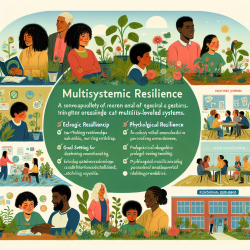The importance of diversity in the clinical and translational research workforce cannot be overstated. It is a crucial element for achieving health equity and enhancing the effectiveness of research outcomes. The research article "Promoting Diversity in the Clinical and Translational Research Workforce" highlights successful initiatives that can serve as a blueprint for practitioners looking to improve their skills and contribute to a more inclusive research environment.
The Power of Diversity
Diversity in the research workforce is instrumental in advancing discovery, eliminating health disparities, and improving minority health. It fosters an environment where different perspectives lead to innovative solutions and more comprehensive patient-centered outcomes. The article emphasizes that training, education, and career development are key strategies for achieving diversity, particularly among minority, underserved, underrepresented populations, and those with special needs.
Successful Initiatives
The University of Puerto Rico Medical Sciences Campus (UPR-MSC) and Morehouse School of Medicine (MSM) have joined forces to create programs aimed at increasing diversity within the clinical and translational research workforce. These programs are supported by the National Institutes of Health (NIH) through the Clinical Research Education and Career Development (CRECD) R25 award.
- UPR-MSC Program: This program offers a post-doctoral Master of Science in Clinical and Translational Research (MSc), developed in collaboration with Mayo Clinic School of Medicine. It focuses on recruiting diverse candidates from various disciplines to foster collaboration across fields.
- MSM Program: Known for its commitment to social mission, MSM offers a Master of Science in Clinical Research (MSCR) degree. The program collaborates with the Atlanta Clinical and Translational Science Institute to expand its reach and support multidisciplinary teams.
Key Strategies for Practitioners
If you are a practitioner looking to enhance your skills by embracing diversity, consider implementing the following strategies inspired by these successful programs:
- Create Inclusive Recruitment Practices: Develop targeted recruitment efforts that reach out to underrepresented groups. Use technology to facilitate remote participation and ensure that your recruitment materials are accessible to diverse audiences.
- Cultivate a Multidisciplinary Environment: Encourage collaboration across different disciplines by forming diverse research committees. This approach not only enriches the research process but also prepares you to address complex health disparities effectively.
- Pursue Continuous Education: Engage in training programs that focus on clinical and translational research. Look for opportunities that offer mentorship from experienced researchers who can guide you through your career development.
The Impact of Mentorship
A critical component of these programs is mentorship. Regular contact between mentors and scholars ensures progress toward goals and addresses any challenges that may arise. As a practitioner, seeking mentorship or becoming a mentor yourself can significantly enhance your professional growth while contributing to the development of future researchers.
The Future of Diversity in Research
The CRECD programs have demonstrated that post-doctoral training can significantly impact workforce diversity by increasing the number of minority researchers. As we look toward the future, expanding collaborations with national workforce programs will be crucial in continuing this progress.
Diversity is not just about numbers; it's about creating an environment where every voice contributes to groundbreaking discoveries that improve health outcomes for all populations. By integrating these strategies into your practice, you can play a vital role in this transformative journey.
Promoting Diversity in the Clinical and Translational Research Workforce










